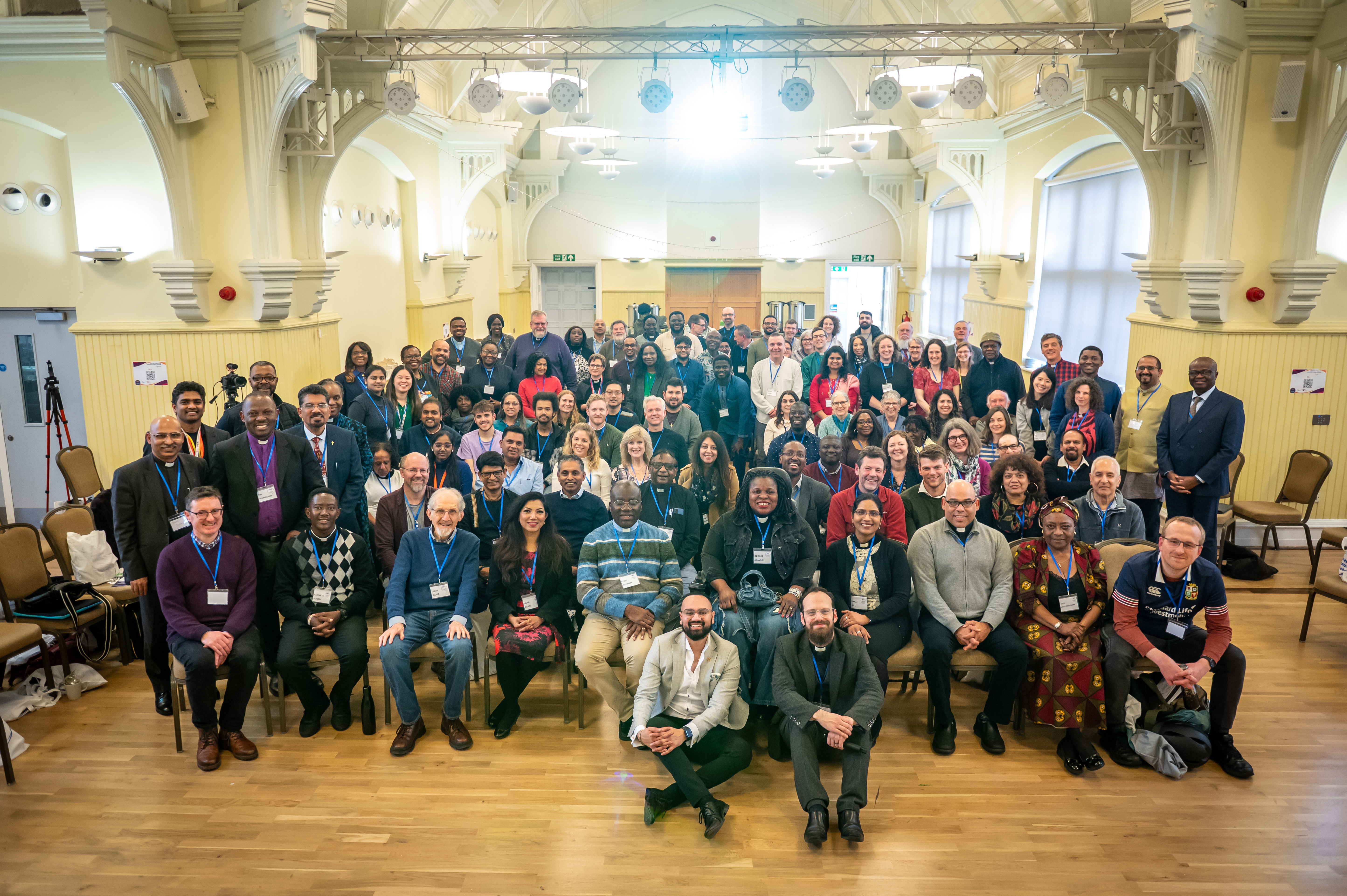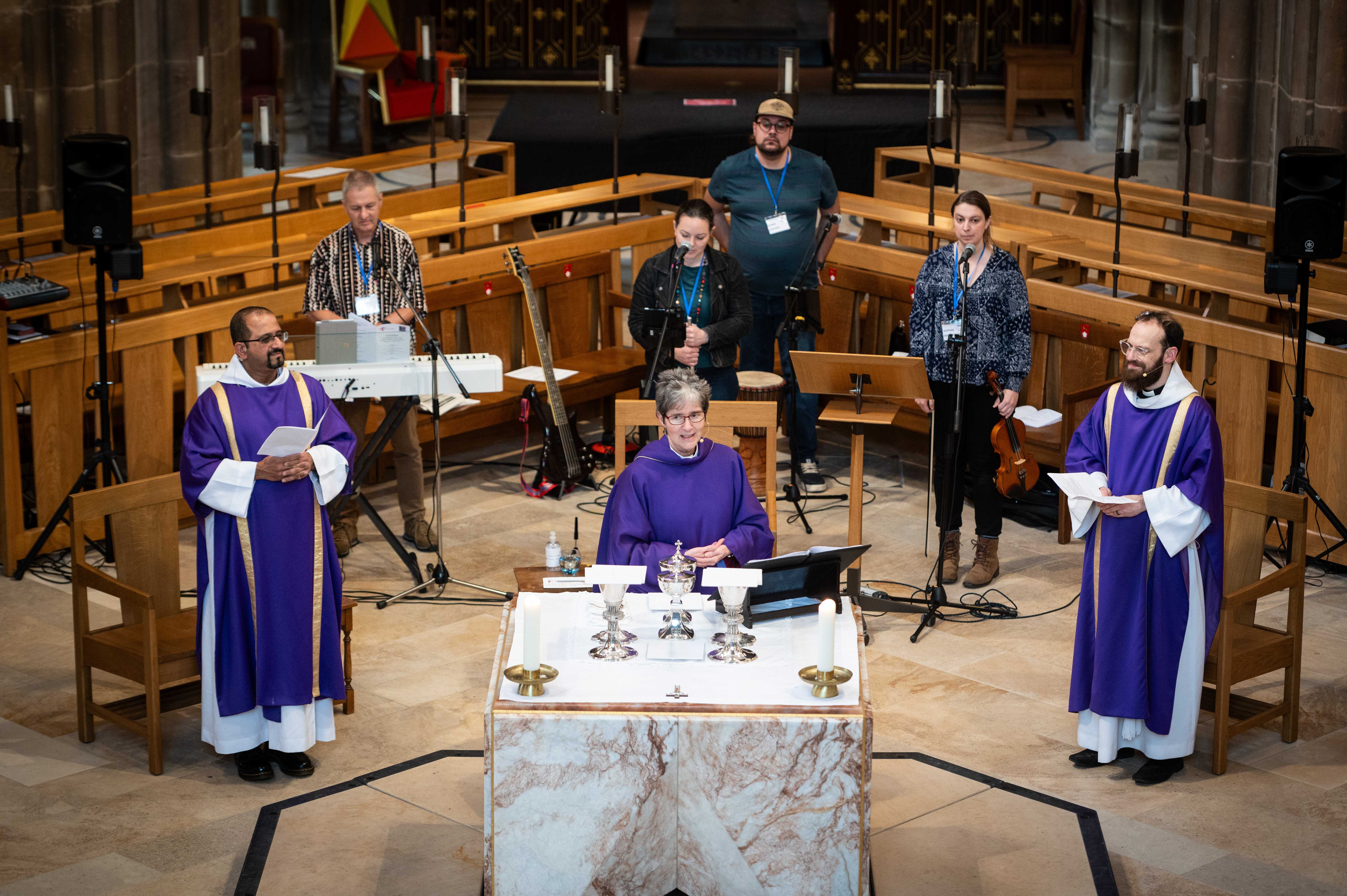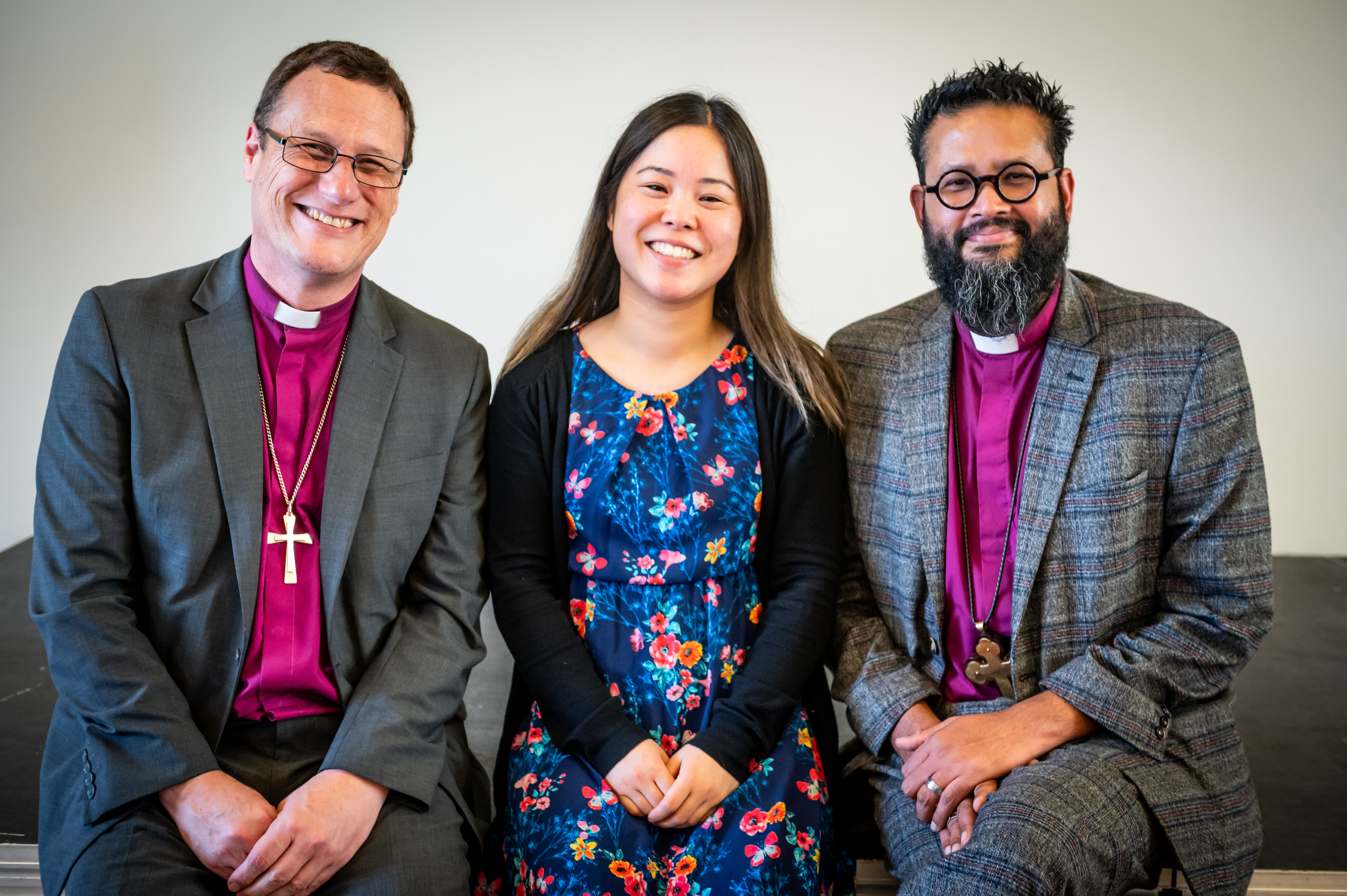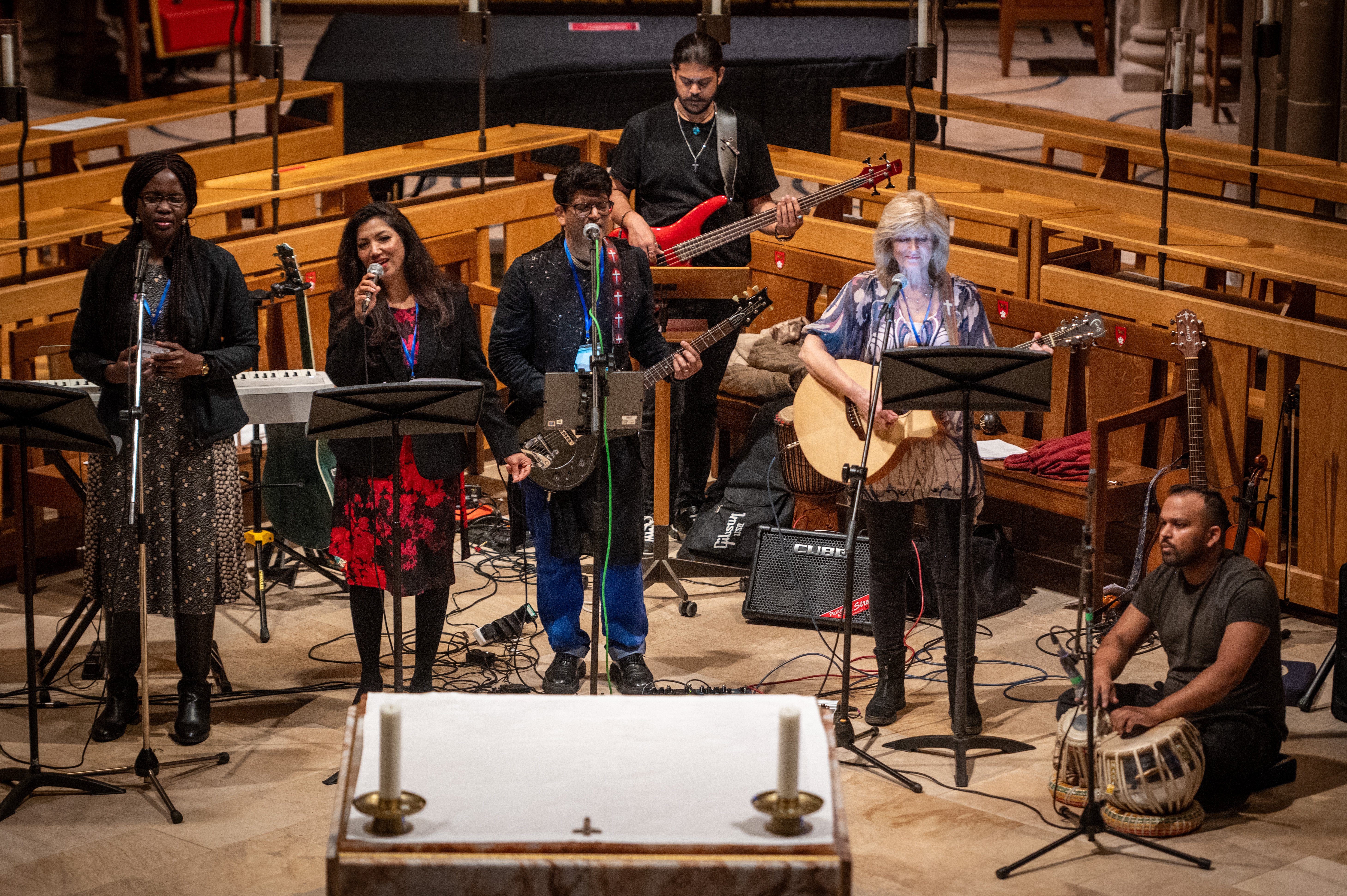 Two hundred people from across the UK and beyond came to Leicester for the three-day Anglican Intercultural Mission Conference between 20 and 22 March in order to learn more about intercultural mission and worship, and racial justice.
Two hundred people from across the UK and beyond came to Leicester for the three-day Anglican Intercultural Mission Conference between 20 and 22 March in order to learn more about intercultural mission and worship, and racial justice.
The conference, which was a partnership between the Diocese of Leicester and the Anglican Network of Intercultural Churches (ANIC) and funded by the Church of England’s Racial Justice Unit, included keynotes and presentations from 20 speakers; an evening concert of intercultural music at the Cathedral, led by Resonance Band; an evening event to mark the UN International Day for the Elimination of Racial Discrimination; and the book launch for Bishop Martyn's new book An Intercultural Church for a Multicultural World.
 As well as keynote speeches and seminars from representatives from various dioceses and the national church, as well as organisations like OMF International and Intercultural Churches UK, there was time for storytelling from leaders and members of intercultural churches, including from our Intercultural Worshipping Communities, and group conversations about practicalities of intercultural mission.
As well as keynote speeches and seminars from representatives from various dioceses and the national church, as well as organisations like OMF International and Intercultural Churches UK, there was time for storytelling from leaders and members of intercultural churches, including from our Intercultural Worshipping Communities, and group conversations about practicalities of intercultural mission.
Jessie Tang, Intercultural Ministry Director for the diocese, said "We were so grateful to be able to partner with ANIC and host this conference in Leicester. It was encouraging to hear that we are leading the way in intercultural ministry across the Church of England! I want to extend my thanks to everyone who attended and who was involved, including our local team of volunteers, and those who led seminars. As we look forward to building on the success of this conference, my hope is that intercultural ministry continues to develop and seep into every aspect of every ministry across the diocese."
Bishop Tim Wambunya, Chair of the Conference, described the key learning points from the conference as follows:
- Exemplifying Unity and Fellowship: The Church must embody unity and fellowship across cultures, reflecting the new humanity in Christ.
- Biblical Roots of Intercultural Worship: Intercultural Worshipping Communities (IWC) derive from Biblical principles, akin to the New Testament Church portrayed in Acts 2.
- Authentic Intercultural Relations: Genuine intercultural relationships require authenticity, love, respect, and truthfulness, as well as acknowledgement of the strengths and limitations of various cultural concepts.
- Embracing Diversity: Churches should embrace diversity with humility and grace, fostering an environment where differences are celebrated rather than homogenised.
- Third Space Identity Exploration: Intercultural Churches serve as a "third space" for exploring identity, fostering personal relationships to combat stereotypes and promote inclusivity.
- Addressing Historical Injustices: Acknowledging and repenting of past and present racism is crucial for achieving God's justice, which is intertwined with issues like climate justice and slavery.
- Acknowledging Intersectional Challenges: Intercultural Worshipping Communities must address intersectional challenges beyond race, including sexuality and class disparities.
- Practising Radical Hospitality: Radical hospitality is vital for the growth of Intercultural Worshipping Communities. It provides sanctuary and refuge, especially for those estranged from their families due to their faith.
- Language and Cultural Expression: Recognising the importance of language, especially in Anglicanism, in fostering a sense of belonging and acceptance within diverse communities.
- Prioritising Intercultural Growth: The Church of England is beginning to prioritise the growth of Intercultural Worshipping Communities, but more support and training pathways for leaders are needed.
 The delegates at the conference also agreed to five ‘Mission Action Points’ which included:
The delegates at the conference also agreed to five ‘Mission Action Points’ which included:
- Creating resources for liturgy, worship, and governance structures, tailored for Intercultural Worshipping Communities which promote inclusivity and representation from various cultural backgrounds.
- Conducting thorough research into the factors that contribute to the growth and sustainability of Intercultural Worshipping Communities.
- Forming regional groups and learning communities for Intercultural Worshipping Communities to support and resource one another.
- Share examples of best practice from existing Intercultural Worshipping Communities.
- Develop training for lay and ordained leaders of Intercultural Worshipping Communities, which covers cross-cultural communication, conflict resolution in multicultural settings, and cultural competency.
 The papers and seminars presented at the conference will be published in an upcoming issue of the Journal for Intercultural Mission.
The papers and seminars presented at the conference will be published in an upcoming issue of the Journal for Intercultural Mission.
Volunteers from the diocese's Intercultural Worshipping Communities helped make the conference a great success.
Richard Pickering, one of the volunteers from Hope Hamilton Church, said, "The feeling of the two and a half days was one of bringing together people with a high degree of commitment and, in many cases, relevant and hard-earned experience in facing up to the need for the Church to engage more fully with the task of becoming more intercultural."
Sangeetha, an intern at the Church of the Martyrs, said, "By the grace of God, I had the privilege to volunteer as a member of the tech team at the Anglican Intercultural Mission Conference. The conference was an incredibly enriching and diverse experience that broadened my understanding of the Anglican Intercultural community and left me feeling inspired to continue learning, growing, and contributing in meaningful ways."
Jo Pearce, another volunteer from the Church of the Martyrs, described some of the 'nuggets of wisdom' shared at the conference, "It is a big step for people of Global Majority Heritage to go from feeling like guests in your church to feeling like they have 'joined the family'. To aim for this you can help by learning worship in other languages - there are some great songs/hymns out there; have an attitude of humility and of the desire to learn from others; step aside to let someone of Global Majority Heritage take a position of leadership or responsibility; listen and then listen some more. Speakers encouraged us to have an unoffendable spirit, spiritual generosity and a sacrificial attitude just as Paul exhorts us in 1 Corinthians 9 v 22, when he says 'I have become all things to all people so that by all possible means I might save some'.
"Most of all though, I just came away so encouraged to see God moving so strongly in and through my Christian brothers and sisters of Global Majority Heritage. Praise God!"